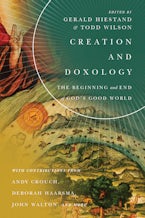- Home
- Guides to Theology
- religion
- Eschatology

Eschatology
By: John C. McDowell and Scott A. Kirkland
Series: Guides to Theology
176 Pages
- Paperback
- ISBN: 9780802864581
- Published By: Wm. B. Eerdmans Publishing Co.
- Published: September 2018
$24.00
Eschatology literally means “the study of last things.” It is a word that, for some, brings to mind visions of global destruction, or perhaps thoughts of mediocre films and a book industry that provide neat interpretations of the relationship between historical events and the trajectory toward the final judgment before God. For still others, eschatology may seem to refer to strange and mysterious portions of the Bible that are perhaps interesting for their weirdness but not so important for reflection on a faith that addresses contemporary concerns. John C. McDowell and Scott A. Kirkland provide readers with a roadmap for understanding a range of approaches to this domain of Christian doctrine in their Eschatology.
Part of the Eerdmans Guides to Theology series, this short volume’s four chapters use Catholic theologian Karl Rahner’s categories of apocalyptic, existential, and christological for three chapters along with a chapter framed by a political lens. Part of the aim of the book is to help readers perceive not only how to understand biblical categories such as the kingdom of God, the new creation, eternal life, and resurrection, but also how the perspective of the reader can play a role in how these themes are interpreted. While in any circumstance it is important that interpreters of scripture are aware of their contextual lenses, eschatology is a particularly important area where this reminder ought to be heeded. There are numerous stories of those such as Harold Camping, who was certain he knew exactly how and when the end would come only to be surprised that his calculations were wrong. This volume can help readers consider the interpretive lens they bring to the biblical text.
The first chapter presents approaches understood as apocalyptic because they attempt to discern how history maps onto biblical language about the circumstances and trajectory of the end, or those that reappropriate apocalyptic images in differing circumstances. The chapter provides examples from the early church era to the present, from medieval Catholicism to conservative dispensationalism to the liberalism expressed by figures such as Albert Schweitzer. The desire to decode or actualize apocalyptic texts has been pursued by a broader range of figures than some might anticipate.
The second chapter presents two types of existential approaches. One is characteristic of the influence of Rudolf Bultmann and conveys eschatology in terms of an encounter humans have with God in faith (a modern skeptical faith). The second is associated with figures from Origen of Alexandria to Hans Urs von Balthasar and speaks of eschatology as a divine drama where God guides people through history. In both approaches, there is less attention to questions about events such as the millennium. Instead, there is a focus on matters such as the way God is understood as the one who is the goal or the way in which eschatology is located within the moment of faith encounter itself. This chapter also includes the feminist theologies of Catherine Keller and Sarah Coakley.
The third chapter addresses approaches that consider how eschatology contributes to the pursuit of a politics of hope. Significant space is given to surveying themes of divine kingship in the Hebrew Bible and New Testament, themes such as resurrection, new heavens and earth, and the kingdom of God. Prominently featured is Augustine’s work in City of God, in which there is refusal to speculate on the timing of the end, along with Jurgen Moltmann’s Theology of Hope, in which eschatology presents the new possibilities (an ethic for the liberative renewing of the world) that result from the person and history of Jesus Christ. The chapter concludes with the Latin American liberation theologies of Gustavo Gutiérrez and Leonardo and Clodovis Boff.
The fourth chapter brings a focus at once obvious but at times strangely decentered: eschatology in relationship to Jesus Christ. When eschatologies prominently emphasize the afterlife or seem to miss or distort the original New Testament message, the focus has sometimes shifted away from the person and work of Christ as the centerpiece of eschatology. Among eschatologies highlighted are those of Ireneaus and Gregory the Theologian; both point out that eschatology cannot be grasped without understanding Christ’s work of recapitulating human history and healing human nature. Unsurprisingly, Karl Barth (one of the most christocentric theologians) is the prominent contemporary figure.
The book closes with a brief summary, followed by one of its most valuable features: a thirty-seven-page annotated bibliography. This alone makes the volume worthwhile because it presents significant summaries of works on eschatology across different disciplines, history, and theological perspectives. In addition to the book’s main chapters, this significant bibliography provides readers with valuable information for further study of this important topic.
Valuable for undergraduate and graduate audiences, McDowell and Kirkland’s compact resource is fine example of a broad introduction to eschatology.
Vincent Bacote is associate professor of theology and director of the Center for Applied Christian Ethics at Wheaton College, Wheaton, Illinois.
Vincent BacoteDate Of Review:March 11, 2021
John C. McDowell is professor of theology and director of research at the University of Divinity in Melbourne, Australia.
Scott A. Kirkland is a postdoctoral research associate at Trinity College Theological School, University of Divinity, Melbourne.











